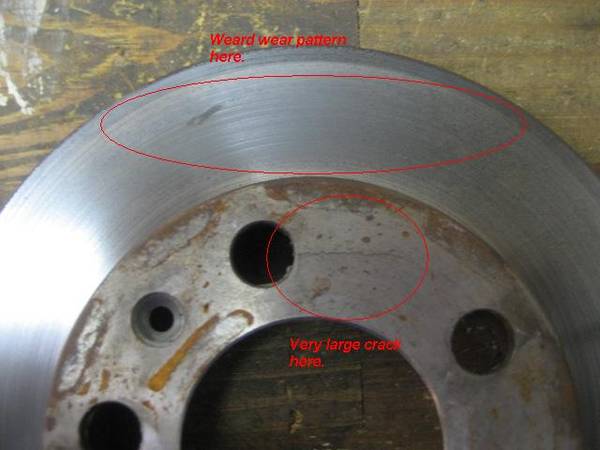|

|
Front rotors corroding, scaling, pitting on inside face only
|
|
|
|  |

|

Frank D
Novice
Apr 17, 2010, 7:26 PM
Post #1 of 15
(11223 views)
|
|
Front rotors corroding, scaling, pitting on inside face only
|
Sign In
|
|
1997 Saturn wagon SW-1 85,000 miles
I've just gone through the third set of rotors in six years that have rusted, scaled, and pitted to the danger point. Each set has lasted only about two years before giving way to heavy pulsations on braking. On replacement it can be seen that this is caused by rusting and flaking of the rotor surfaces, on the inner face only. The shiny surface of the rotor that is in contact with the pad is actually flaking and chipping off from the body, and underneath that it's all rough and rusty. I haven't driven more than 3,000 miles a year in the past six years, so I'm baffled as to why and how this happens.
I've been told that this could be caused by overly heavy braking, which might cause warping, but there's no visible warping and I'm not any heavier a braker than anyone else I've ridden with. In Googling the web I haven't found much on this subject -- at least not to the extent of mine -- but I have seen a comment that this could be caused by overly tight lug nuts.
Any comments or advice? Thanks!
Frank
|
|
|  |

|

Tom Greenleaf
Ultimate Carjunky
/ Moderator

Apr 18, 2010, 2:11 AM
Post #2 of 15
(11218 views)
|
|
Re: Front rotors corroding, scaling, pitting on inside face only
|
Sign In
|
|
Calipers need be known good and lubricated at slides, pins etc.
A low mile, low per year use, with possible outdoor parking is trouble to brakes rust wise. There are different grades of rotors from super cheap low grade metal to my favorite "Centric" ones which come turned and with baked on paint on many types to minimize rust. Friction surface can't be painted but metal grade can make a difference,
T

|
|
|  |

|

Frank D
Novice
Apr 18, 2010, 6:30 AM
Post #3 of 15
(11209 views)
|
|
Re: Front rotors corroding, scaling, pitting on inside face only
|
Sign In
|
|
Thanks for your reply, Tom. Yes I park outside, but many of my relatives and friends do also and have never had this problem. The rotors and pads that were installed this time are Duralast and the pads are ceramic (Cmax), both of which are higher quality than my previous ones, so I guess we'll have to wait and see.
Frank
|
|
|  |

|

Tom Greenleaf
Ultimate Carjunky
/ Moderator

Apr 18, 2010, 7:06 AM
Post #4 of 15
(11207 views)
|
|
Re: Front rotors corroding, scaling, pitting on inside face only
|
Sign In
|
|
You said it - " Time will tell" and hope they do better. I just know the super cheap (legal to use) ones I've seen here are real junk. Even have seen bubble holes in them and most required machining/turning before use as they were just as crumby as if only poured into a mold!
Rusted rotors is plain a problem in low use, outdoor garaged vehicles. I don't think they make a totally rust free rotor or drum for brakes. The better stuff one hopes uses both a higher grade of metal. I do like the ceramic pads so far have lasted long and silent as they claimed.
Have the brakes looked at and request a good look at inside at tire rotation time to know the situation over time. I do find inside parts don't dry off from overnight dew as fast as the outside parts you see, some even thru the wheels,
T

|
|
|  |

|

Frank D
Novice
Apr 18, 2010, 10:04 AM
Post #5 of 15
(11197 views)
|
|
Re: Front rotors corroding, scaling, pitting on inside face only
|
Sign In
|
|
Thanks, Tom!
1) I had no idea there was that much variation in quality.
2) I had the lines bled and new brake fluid put in.
3) I hope I'm in for a better experience this time.
Frank
|
|
|  |

|

Tom Greenleaf
Ultimate Carjunky
/ Moderator

Apr 18, 2010, 10:52 AM
Post #6 of 15
(11193 views)
|
|
Re: Brake metal quality
|
Sign In
|
|
Just to beat this subject up some more I just found a couple pics out there showing some quality differences. Puters and the web always amaze me as to what's documented out there.
Here's what is a good example of a cheap rotor, used but showing problems early,

Now my current favorite and I'll give them the plug "Centric" that is finely made and machined, painted in areas that can rust. In fairness the pic is of a new one but you can see the detail,

All should be but these are particularly well balanced as well. Some skip that part and it spins with your wheel so if it's way off so is that wheel. More than most folks think about it and nobody like hearing that more $$ is the better deal in the long run but most of the time it sure is!
Have a great day,
T

|
|
|  |

|

Frank D
Novice
Apr 18, 2010, 12:21 PM
Post #7 of 15
(11187 views)
|
|
Re: Brake metal quality
|
Sign In
|
|
Tom, sorry but that image of the rotor problems didn't come through.
Just to complete the subject, here are links to a couple of pictures of my old rotors, taken yesterday. I hope these come through.
http://anyhub.net/file/100_1857-.jpg - corroded left front rotor (inside face)
http://anyhub.net/file/100_1860-.jpg - corroded right front rotor (inside face)
Frank
|
|
|  |

|

Hammer Time
Ultimate Carjunky
/ Moderator

Apr 18, 2010, 12:29 PM
Post #8 of 15
(11181 views)
|
|
Re: Brake metal quality
|
Sign In
|
|
That stuff is just coming off in big chunks. I'm not sure where you live but that looks like salt damage. I run a shop on the ocean and I see that all the time and there is nothing that will prevent it other than getting away from the ocean or source of the salt. I could look at the car and be able to tell the customer which side of the car faced the ocean when it was parked because the problem would be so much worse facing that direction. Driving it more often will help and make sure that the slides are good and free and not frozen also.
~~~~~~~~~~~~~~~~~~~~~~~~~~~~~~~~~~~~~~~~~~~~~~~~~~~~~~~~~~~~~~~~~~~~
We offer help in answering questions, clarifying things or giving advice but we are not a substitute for an on-site inspection by a professional.
|
|
|  |

|

Frank D
Novice
Apr 18, 2010, 1:06 PM
Post #9 of 15
(11177 views)
|
|
Re: Brake metal quality
|
Sign In
|
|
That stuff is just coming off in big chunks. I'm not sure where you live but that looks like salt damage. I run a shop on the ocean and I see that all the time and there is nothing that will prevent it other than getting away from the ocean or source of the salt. I could look at the car and be able to tell the customer which side of the car faced the ocean when it was parked because the problem would be so much worse facing that direction. Driving it more often will help and make sure that the slides are good and free and not frozen also.
HT, it can't be salt damage from the ocean because I live in Rochester, NY, nowhere near the ocean, and I don't ever drive more than 20 miles or so from home. However, here in the northeast they salt the roads in the winter, and when the road spray has dried on your car, it looks like you've been driving through whitewash. Even so, I've lived here for over 40 years and I've never had this brake rusting problem with any of the 5 or 6 other cars I've owned. And since it's only the inner faces of both rotors that are corroding (not the outer faces at all), it can't be due to the weather (snow or rain) because that would mostly affect the outer faces. Yes, it's possible that it's due to the road salt, but brake corrosion never happened to the least degree in any other car I've had. It's a mystery (an expensive one) to me.
Frank
|
|
|  |

|

Hammer Time
Ultimate Carjunky
/ Moderator

Apr 18, 2010, 1:09 PM
Post #10 of 15
(11173 views)
|
|
Re: Brake metal quality
|
Sign In
|
|
Upstate New York salt is no different than the ocean. I was just comparing my experience with salt. You are in a heavy salt area and you probably had some get packed up there at one time and it went to work.
~~~~~~~~~~~~~~~~~~~~~~~~~~~~~~~~~~~~~~~~~~~~~~~~~~~~~~~~~~~~~~~~~~~~
We offer help in answering questions, clarifying things or giving advice but we are not a substitute for an on-site inspection by a professional.
|
|
|  |

|

Frank D
Novice
Apr 19, 2010, 10:49 AM
Post #11 of 15
(11166 views)
|
|
Re: Brake metal quality
|
Sign In
|
|
Thanks, HT!
I'm going to assume from Hammer Time's response, if nobody offers any other convincing ideas to the contrary, that the cause of my brake rotors' deterioration over the last six years is road salt. But as TV detective Columbo was fond of saying, just one last thing. I still have a nagging thought: could hard braking have caused or contributed to this condition (please see the pictures I posted above). Now I know I don't do hard braking. I have no reason to. I'm not an aggressive driver. I do mainly city driving and make no sudden or hard stops. I don't have a "lead foot." But just to put this idea to rest, of hard braking causing overheating and warping of the rotors, leading to the condition you can see in the photos, in case anyone raises it, I wonder if anyone would have a comment in that regard. Thank you!
Frank
(This post was edited by Frank D on Apr 19, 2010, 10:56 AM)
|
|
|  |

|

Tom Greenleaf
Ultimate Carjunky
/ Moderator

Apr 19, 2010, 11:19 AM
Post #12 of 15
(11162 views)
|
|
Re: Brake metal quality
|
Sign In
|
|
OK Columbo!

Salt - plain sodium chloride is used on roads and the type of salt in ocean water. It's highly corrosive to cars, boats, ships even, buoys, moorings and all!
When steel is made there are a bazillion ways to enhance its resistance to corrosion. Most all - even stainless will give out that protection especially with heat - takes a lot longer though. High carbon steel is better than no carbon steel but doesn't tolerate heat for long either.
Exhaust and brake parts get both wet with salty water and are hot so go faster than other metal.
Why the inside? Guess is that it gets hotter, less vented there, and dries out slower could explain it(??)
T

|
|
|  |

|

Frank D
Novice
Apr 19, 2010, 7:07 PM
Post #13 of 15
(11154 views)
|
|
Re: Brake metal quality
|
Sign In
|
|
Tom, regarding the question of why only the inside face of each rotor corrodes, I can think of the salt spray from each front tire splashing over to the inside face of the opposite wheel. The outside face never gets splashed this way.
My only remaining questions are, why this car and nobody else's that I know of, here in the same part of the state, three times in six years running, and why in the past six years has it happened three times but never before? I've never had to replace the rotors on any of my other cars in my whole life. It just never happened.
Whatever the cause, it's a real mystery.
Frank
|
|
|  |

|

Hammer Time
Ultimate Carjunky
/ Moderator

Apr 19, 2010, 7:10 PM
Post #14 of 15
(11150 views)
|
|
Re: Brake metal quality
|
Sign In
|
|
It's just the specific situations that you were in this year. you likely traveled in a storm that packed some salty slush up under the car and it likely stayed there for a while and went to work. It's not a big mystery. It's just salt damage. Don't try to over analyze it.
~~~~~~~~~~~~~~~~~~~~~~~~~~~~~~~~~~~~~~~~~~~~~~~~~~~~~~~~~~~~~~~~~~~~
We offer help in answering questions, clarifying things or giving advice but we are not a substitute for an on-site inspection by a professional.
|
|
|  |

|

re-tired
Veteran
/ Moderator

Apr 19, 2010, 7:53 PM
Post #15 of 15
(11146 views)
|
|
Re: Brake metal quality
|
Sign In
|
|
I love a good mystery. By any chance has the butler driven the car? Heres my opinion, for what its worth. In most cases I have found that exessive wear, heat on inside only is caused by frozen or tight slides or pins. the piston pushes out and applies the inner pad the caliper body must then slide over to apply the outer pad. No slide and the inner does all work and creates uneven exessive heat. Your current vehicle may have a caliper design more prone to sticking. Heres my opinion, for what its worth. In most cases I have found that exessive wear, heat on inside only is caused by frozen or tight slides or pins. the piston pushes out and applies the inner pad the caliper body must then slide over to apply the outer pad. No slide and the inner does all work and creates uneven exessive heat. Your current vehicle may have a caliper design more prone to sticking.

LIFE'S SHORT GO FISH
|
|
|  |
|





